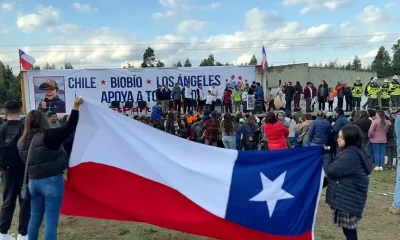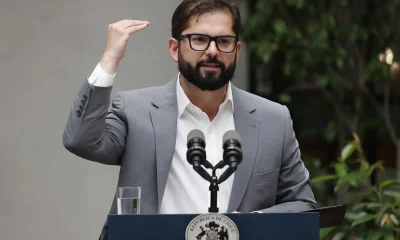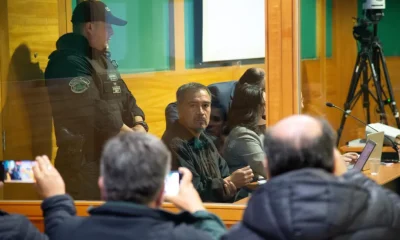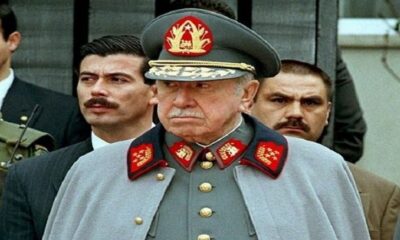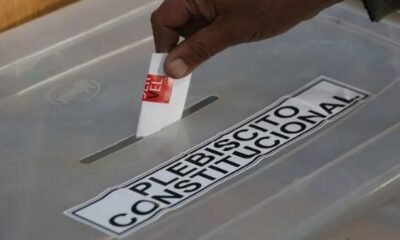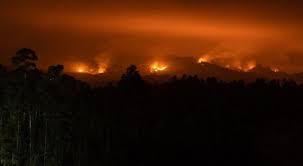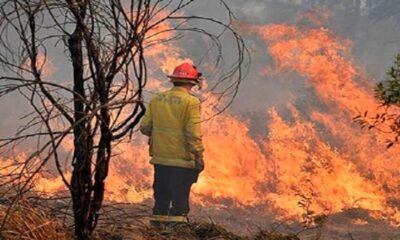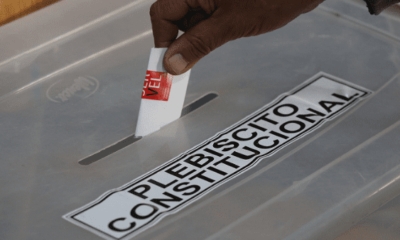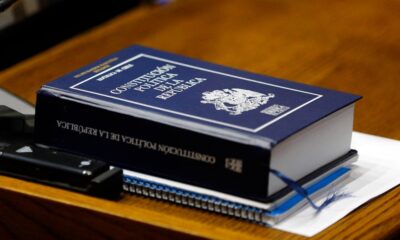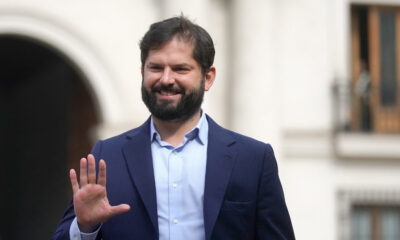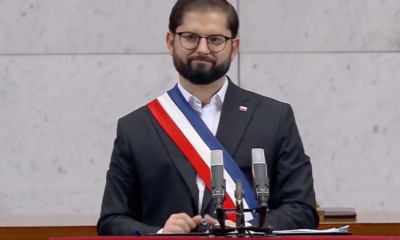International
Gabriel Boric closes January with an average approval rating of 27 %
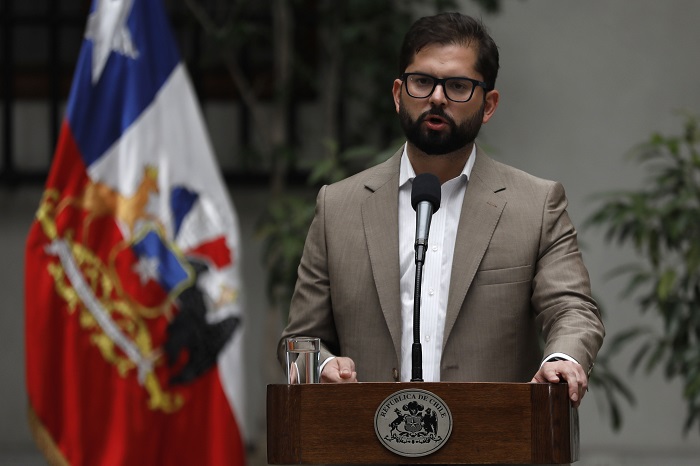
February 1st |
The President of Chile, Gabriel Boric, closed January with 27 % approval, three points less than the previous month. While disapproval reached 68 %, four points higher than the previous month, published the research firm Cadem in its latest survey.
This level of disapproval is the highest figure since he took office on March 11, 2022. In his first month in the Executive, Boric obtained 28 % of disapproval, but consecutively this percentage increased.
The following month it was 49 %, in May 53 %, in June 54 %, in July 57 %, in August 56 %, in September 57 %, in October 65 %, in November 63 % and in December 64 %.
Meanwhile, 68 % of the participants said that they have lost confidence in the leftist president and only 31 % trust him. When he came to power, Chileans gave him 54 % confidence.
In addition, 86 % of Chileans surveyed considered that Boric does not have the experience to govern. Cadem also shared that 68 % believe that he does not have the capacity to solve the country’s problems either.
Another 66 % considered that he will not be able to lead the necessary changes at the right pace. A 68 % said that he does not have authority and leadership and an equal percentage said the same about the government team, ministers and undersecretaries. Likewise, 69 % indicated that he does not have the capacity to manage crises.
The worst evaluated areas of Boric’s government are the fight against crime and drug trafficking, with 78 % disapproval; inflation, with 76 % disapproval; and immigration, with 82 % disapproval.
Other areas of disapproval are education, with 61 %; health, with 67 %; economy and employment, with 68 %; the Mapuche conflict, with 69 %; and public order, with 76 %.
On January 11, Congress approved the fifteenth extension of the state of emergency which continues in the Araucanía region and two Biobío regions until mid-February. This allows the President to order the deployment of the military in areas where Mapuche protests are taking place.
Translated with www.DeepL.com/Translator (free version)
International
DHS Secretary Kristi Noem’s Purse Stolen in D.C. Restaurant Heist

The purse of Kristi Noem, Secretary of the Department of Homeland Security, was stolen on Sunday night at a restaurant in Washington, D.C., Fox News Digital confirmed through several agency sources.
The handbag, taken by a white male wearing a mask, reportedly contained $3,000 in cash along with personal documents, including her passport, keys, driver’s license, and DHS badge, according to an agency spokesperson.
“Her entire family was in town, including her children and grandchildren. She was celebrating her retirement by treating them to dinner, activities, and Easter gifts,” the spokesperson added.
Crime continues to be a significant issue in the U.S. capital, particularly theft. However, violent crime reached its lowest level in 30 years last year, according to the Office of the Attorney General at the time.
International
Pope Francis: The Quiet Architect Behind the U.S.-Cuba Thaw
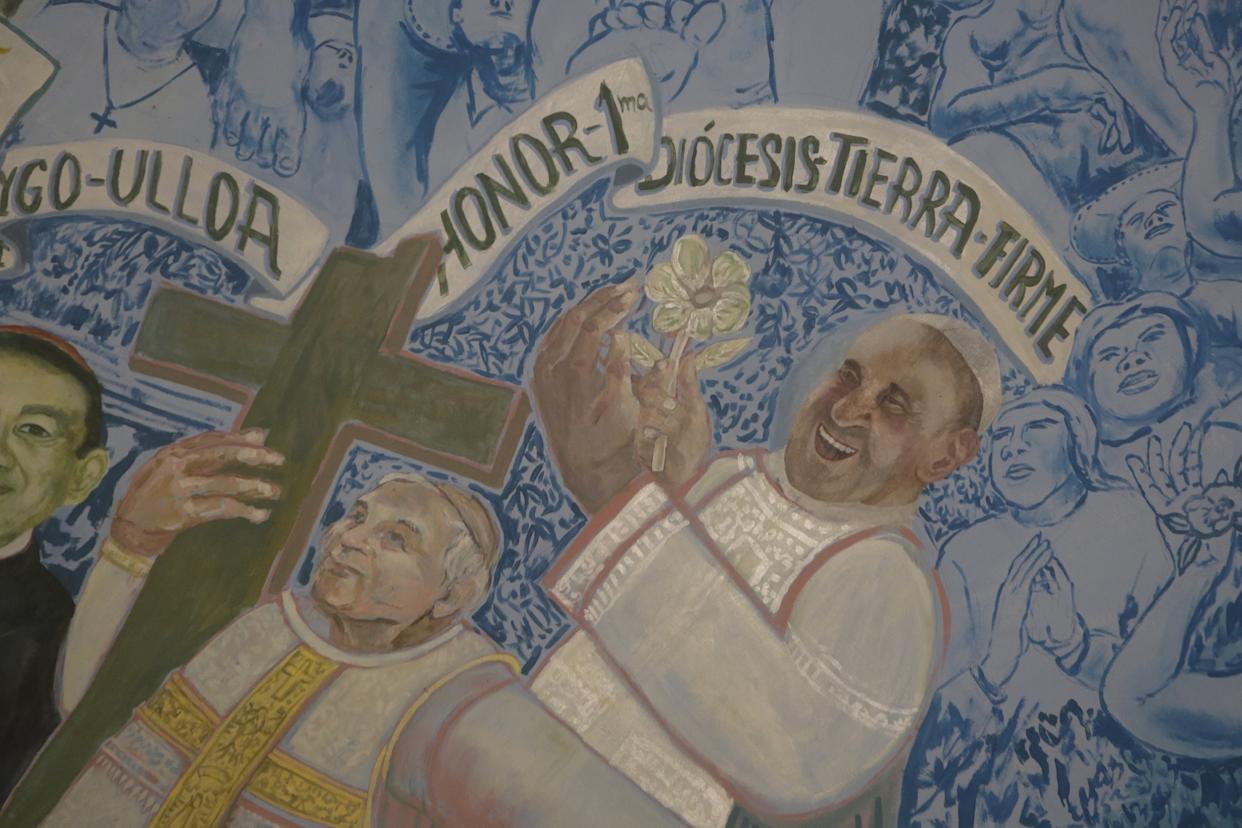
When then-U.S. President Barack Obama and Cuban President Raúl Castro announced the reestablishment of diplomatic relations in December 2014—after decades of hostility—there was a third figure present in both speeches: Pope Francis.
This thaw in U.S.-Cuba relations—later reversed by Donald Trump—was the result of behind-the-scenes negotiations personally encouraged by Pope Francis, who passed away on Monday at the age of 88, just over a year after becoming head of the Catholic Church.
Upon learning the news of the breakthrough, the pontiff humbly stated, “This was made possible thanks to the ambassadors and to diplomacy,” which he called “a noble, very noble job.”
In 2015, months after the announcement, Raúl Castro visited the Vatican and met with the pope. Over time, Castro developed a fondness for Francis that he never had for his predecessors, Benedict XVI and John Paul II. “If the Pope continues talking like this, sooner or later I’ll start praying again and return to the Catholic Church—and I’m not joking,” said the younger Castro, who, like his brother Fidel (1926–2016), had been educated by Jesuits—the same order to which Pope Francis belonged.
Pope Francis visited Cuba later that year. Just days before his arrival, the Cuban government announced the pardon of 3,522 common prisoners as an act of clemency.
While in Havana, the pope met with Fidel Castro, who gave him a first edition of the book Fidel and Religion by Brazilian friar and liberation theologian Frei Betto.
Criticism from the Opposition
Francis’s diplomatic approach also drew criticism from parts of the Cuban opposition. In a 2022 interview with Univision, the pope revealed he had “a human relationship” with Raúl Castro.
International
Dominican Republic Declares Three Days of Mourning for Pope Francis

Dominican Republic President Luis Abinader has declared three days of national mourning starting Tuesday following the death of Pope Francis, who passed away on Monday at the age of 88 in his residence at the Casa Santa Marta.
In an official decree, Abinader highlighted the pope’s legacy “as a global leader who promoted significant reforms within the Catholic Church and was known for his humility, openness to dialogue, and commitment to peace among nations.”
During the mourning period, the national flag will be flown at half-staff at military facilities and public buildings.
According to a statement from the Office of the Presidency, although Pope Francis never visited the Dominican Republic during his papacy, he maintained a close relationship with the country. He expressed solidarity and empathy during difficult times, including offering prayers for the victims of the recent tragedy at a Santo Domingo nightclub on April 8, which claimed 232 lives and left more than 180 injured.
-

 Central America5 days ago
Central America5 days agoNicaraguan Exiles to Mark 7th Anniversary of 2018 Protests with Global Commemorations
-

 International5 days ago
International5 days agoDominican ‘False Hero’ Arrested for Faking Role in Nightclub Collapse That Killed 231
-

 Central America4 days ago
Central America4 days agoUN complaint filed against Costa Rica over detention of migrant children
-

 International4 days ago
International4 days agoACLU seeks emergency court order to stop venezuelan deportations under Wartime Law
-

 Central America2 days ago
Central America2 days agoSenator Van Hollen Meets with Deported MS-13 Member in El Salvador; Trump and Bukele React
-

 International3 days ago
International3 days agoThousands rally nationwide against Trump’s threat to U.S. democracy
-

 International2 days ago
International2 days agoPope Francis Appears for Easter Blessing, Calls for Peace and Religious Freedom
-

 Central America17 hours ago
Central America17 hours agoCardinal Rodríguez to Attend Funeral of Pope Francis: “He Was Very Dear to Me”
-

 Central America17 hours ago
Central America17 hours agoNicaragua’s Ortega and Murillo Mourn Pope Francis, Acknowledge ‘Difficult’ Relationship
-

 International17 hours ago
International17 hours agoDominican Republic Declares Three Days of Mourning for Pope Francis
-

 International17 hours ago
International17 hours agoDHS Secretary Kristi Noem’s Purse Stolen in D.C. Restaurant Heist
-

 International17 hours ago
International17 hours agoPope Francis: The Quiet Architect Behind the U.S.-Cuba Thaw
















